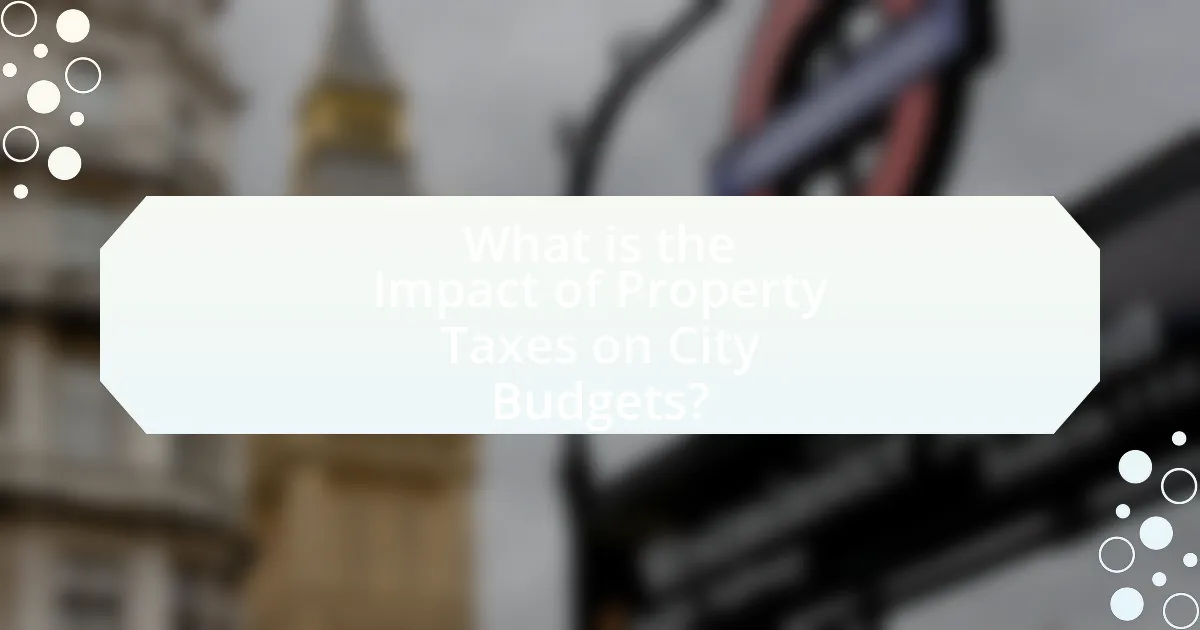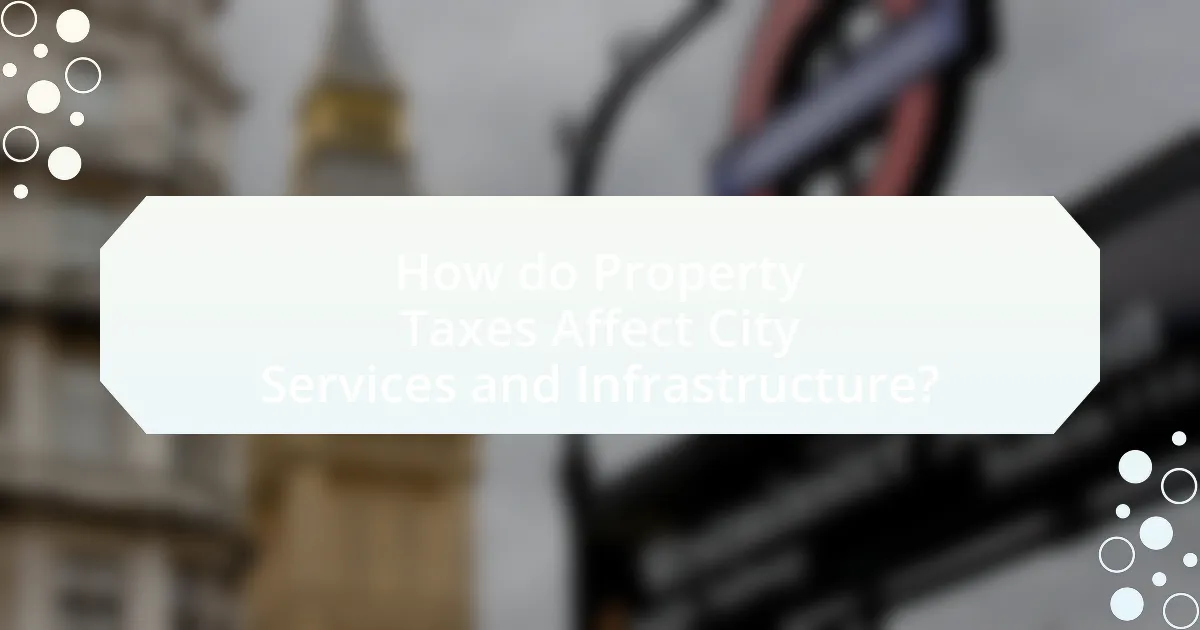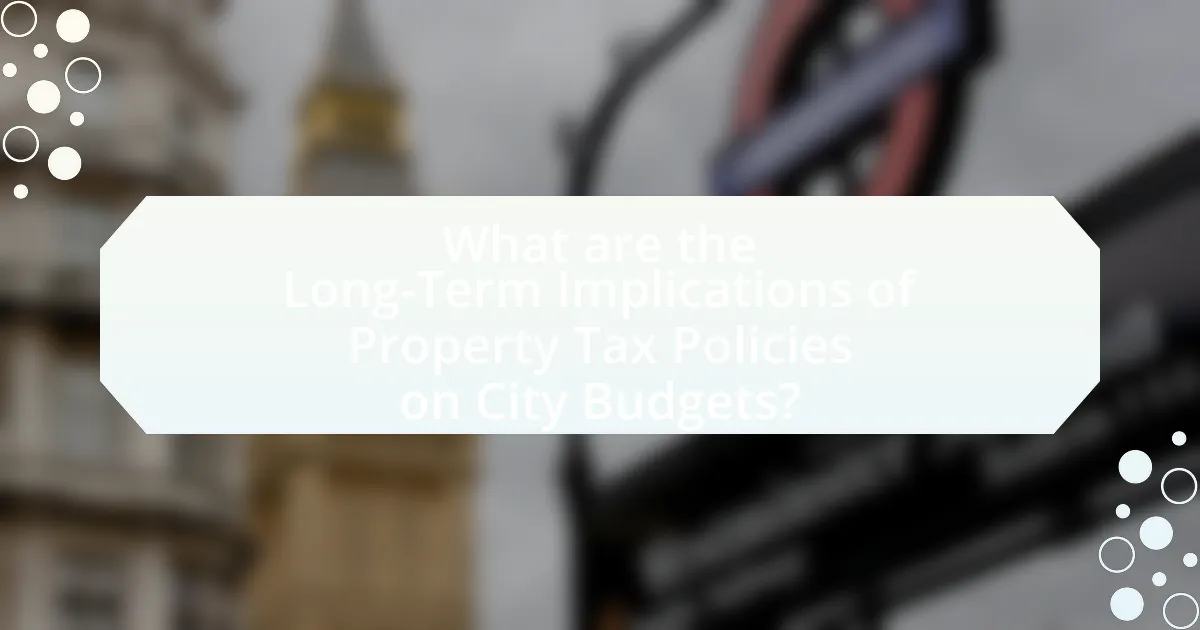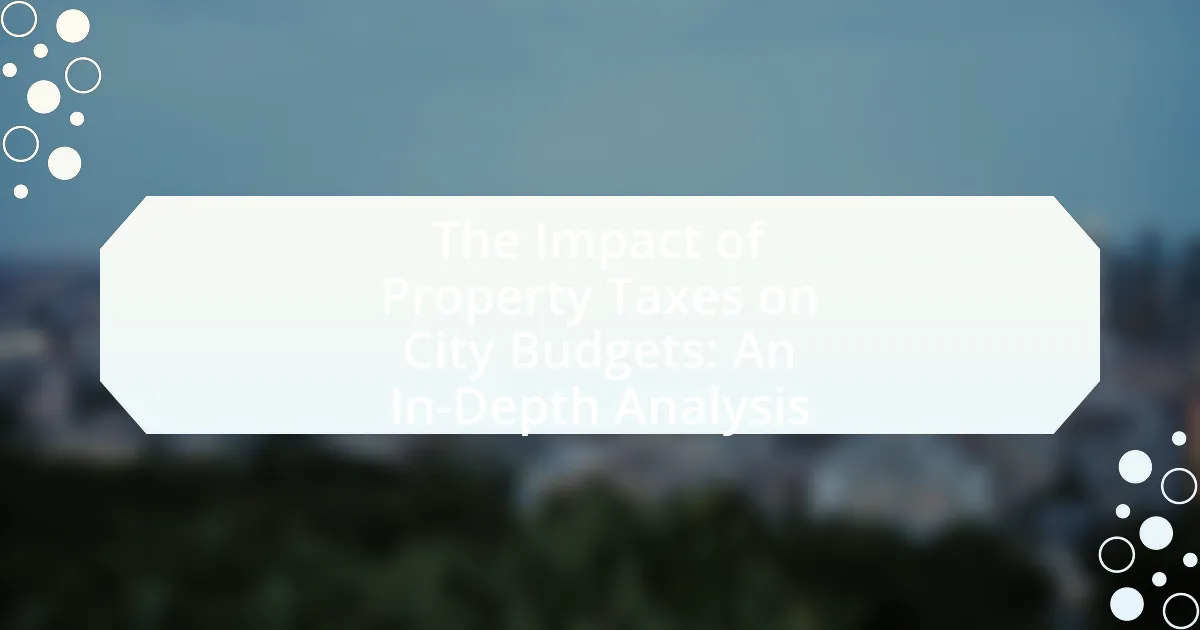The article examines the significant impact of property taxes on city budgets, highlighting their role as a primary revenue source for local governments. Property taxes typically account for 30% to 50% of municipal funding, essential for financing services such as public safety, education, and infrastructure maintenance. The analysis includes variations in property tax rates across different cities, the challenges cities face regarding fluctuating property values, and the implications of property tax policies on long-term financial stability. Additionally, it discusses how property taxes influence local economic development and the importance of diversifying revenue sources to mitigate risks associated with over-reliance on property taxes.

What is the Impact of Property Taxes on City Budgets?
Property taxes significantly influence city budgets by serving as a primary source of revenue for local governments. These taxes typically account for a substantial portion of municipal funding, often ranging from 30% to 50% of total revenue, depending on the jurisdiction. This revenue is crucial for financing essential services such as public safety, education, infrastructure maintenance, and community development. For instance, in the United States, the National League of Cities reported that property taxes contributed approximately $500 billion to local government revenues in 2020, underscoring their vital role in sustaining city operations and services.
How do property taxes contribute to city revenue?
Property taxes are a primary source of revenue for cities, accounting for a significant portion of local government funding. These taxes are levied on real estate properties based on their assessed value, providing municipalities with funds necessary for essential services such as public safety, infrastructure maintenance, and education. For instance, in the United States, property taxes typically represent about 70% of local tax revenue, highlighting their critical role in financing city operations and services.
What percentage of city budgets typically comes from property taxes?
Typically, property taxes account for approximately 30% to 40% of city budgets. This percentage can vary based on the specific city and its reliance on different revenue sources. For instance, the National League of Cities reported that property taxes are a significant revenue source for local governments, often ranking as the largest single source of tax revenue. This reliance on property taxes underscores their critical role in funding essential services such as public safety, infrastructure, and education within urban areas.
How do property tax rates vary across different cities?
Property tax rates differ significantly across cities, influenced by local government policies, funding needs, and property values. For instance, as of 2023, cities like Detroit have a property tax rate of approximately 55.5 mills, while San Francisco’s rate is around 1.19% of assessed value. This variation is due to factors such as the economic base of the city, the level of public services provided, and the overall tax structure. Additionally, cities with higher property values may have lower tax rates, as seen in New York City, where the effective tax rate is lower despite high property values, compared to cities with lower property values that may impose higher rates to meet budgetary needs.
Why are property taxes a critical component of local government funding?
Property taxes are a critical component of local government funding because they provide a stable and significant source of revenue for essential public services. Local governments rely on property taxes to finance education, public safety, infrastructure maintenance, and community services, which collectively account for a substantial portion of their budgets. For instance, in the United States, property taxes typically represent about 70% of local tax revenue, underscoring their importance in sustaining local operations and services. This reliance on property taxes ensures that local governments can maintain fiscal stability and meet the needs of their communities effectively.
What services are primarily funded by property tax revenue?
Property tax revenue primarily funds essential local services such as public education, public safety, infrastructure maintenance, and local government operations. For instance, in the United States, approximately 60% of property tax revenue is allocated to public schools, which underscores the critical role of property taxes in supporting education. Additionally, local police and fire departments, which ensure community safety, receive significant funding from property taxes, often accounting for a substantial portion of municipal budgets. Infrastructure projects, including road repairs and public transportation systems, also rely heavily on property tax revenue, facilitating community development and maintenance.
How do property taxes influence local economic development?
Property taxes significantly influence local economic development by providing essential funding for public services and infrastructure. These taxes generate revenue that local governments use to invest in schools, roads, and public safety, which in turn attracts businesses and residents. For instance, a study by the Lincoln Institute of Land Policy found that municipalities with higher property tax revenues often experience increased economic growth due to improved public services and infrastructure investments. Additionally, effective property tax policies can incentivize development in underutilized areas, fostering economic revitalization.
What challenges do cities face regarding property tax revenue?
Cities face significant challenges regarding property tax revenue, primarily due to fluctuating property values and economic downturns. When property values decline, cities experience reduced tax revenues, which can lead to budget shortfalls. For instance, during the 2008 financial crisis, many cities saw property tax revenues drop by as much as 20% as home values plummeted. Additionally, cities often grapple with the inequities in property tax assessments, where some properties may be overvalued or undervalued, leading to disparities in revenue generation. Furthermore, the increasing trend of tax exemptions and incentives for businesses can further erode the tax base, complicating fiscal planning for essential services. These factors collectively hinder cities’ ability to maintain infrastructure and public services effectively.
How do fluctuations in property values affect city budgets?
Fluctuations in property values significantly impact city budgets by directly influencing property tax revenues. When property values rise, cities typically experience an increase in tax revenue, which can enhance funding for public services such as education, infrastructure, and emergency services. Conversely, when property values decline, tax revenues decrease, leading to potential budget shortfalls that may force cities to cut services or increase taxes elsewhere. For example, during the 2008 financial crisis, many cities faced budget deficits due to plummeting property values, resulting in reduced public services and layoffs. This correlation between property values and city budgets underscores the importance of stable real estate markets for municipal financial health.
What impact do tax exemptions and abatements have on revenue?
Tax exemptions and abatements significantly reduce government revenue by lowering the taxable base. When municipalities grant these incentives, they forgo potential tax income, which can lead to budget shortfalls. For instance, a study by the Lincoln Institute of Land Policy found that property tax abatements can decrease local tax revenues by 10% to 30% in affected areas, impacting funding for essential services such as education and infrastructure. This reduction in revenue can strain city budgets, forcing local governments to either cut services or raise taxes elsewhere to compensate for the lost income.

How do Property Taxes Affect City Services and Infrastructure?
Property taxes significantly influence city services and infrastructure by providing essential funding for local government operations. These taxes are a primary revenue source for municipalities, enabling them to finance public services such as education, public safety, road maintenance, and sanitation. For instance, in 2020, property taxes accounted for approximately 31% of local government revenue in the United States, underscoring their critical role in sustaining city functions. When property tax revenues increase, cities can enhance infrastructure projects, improve service delivery, and invest in community development. Conversely, a decline in property tax revenues can lead to budget cuts, reduced services, and deferred maintenance of infrastructure, negatively impacting residents’ quality of life.
What role do property taxes play in funding essential city services?
Property taxes are a primary source of revenue for funding essential city services. They typically account for a significant portion of local government budgets, often funding services such as public safety, education, infrastructure maintenance, and sanitation. For instance, in the United States, property taxes contribute approximately 72% of local tax revenue, according to the U.S. Census Bureau. This revenue is crucial for maintaining the quality and availability of services that directly impact residents’ daily lives, ensuring that cities can operate effectively and meet community needs.
How do property taxes support public safety and emergency services?
Property taxes provide essential funding for public safety and emergency services by allocating a significant portion of local government revenue to these critical areas. Specifically, property tax revenues are used to finance police departments, fire services, emergency medical services, and disaster response initiatives. For instance, in the United States, local governments often rely on property taxes for approximately 70% of their funding, which directly supports the salaries of first responders, maintenance of emergency equipment, and operational costs of public safety facilities. This financial structure ensures that communities can effectively respond to emergencies, maintain law and order, and provide necessary services to residents, thereby enhancing overall public safety.
What is the relationship between property taxes and public education funding?
Property taxes are a primary source of funding for public education in many jurisdictions. This relationship exists because local governments often allocate a significant portion of property tax revenue to school districts, which rely on these funds to support operational costs, salaries, and educational programs. For instance, in the United States, approximately 45% of public school funding comes from local property taxes, highlighting the critical role these taxes play in financing education. Consequently, fluctuations in property tax revenues can directly impact the quality and availability of educational resources in public schools.
How do property taxes influence infrastructure development and maintenance?
Property taxes significantly influence infrastructure development and maintenance by providing essential funding for local governments. These taxes are a primary source of revenue, which municipalities allocate to build and maintain roads, bridges, public transportation, and utilities. For instance, in the United States, property taxes account for approximately 72% of local tax revenue, directly impacting the ability of cities to invest in infrastructure projects. When property tax revenues increase, municipalities can enhance infrastructure quality and expand services, while declines in property tax revenue often lead to budget cuts, resulting in deferred maintenance and reduced development initiatives. This correlation underscores the critical role property taxes play in shaping the infrastructure landscape of communities.
What types of infrastructure projects are typically funded by property taxes?
Property taxes typically fund essential infrastructure projects such as public schools, roads, bridges, parks, and public safety facilities. These projects are crucial for community development and maintenance, as they directly impact the quality of life for residents. For instance, according to the National Association of Counties, approximately 30% of local government revenue comes from property taxes, which are often allocated to these infrastructure needs. This funding model ensures that local governments can maintain and improve public services that benefit the community.
How do cities prioritize infrastructure spending based on property tax revenue?
Cities prioritize infrastructure spending based on property tax revenue by assessing the amount of revenue generated from property taxes and aligning it with community needs and strategic goals. This prioritization process often involves analyzing the projected revenue from property taxes, which can fluctuate based on property values and tax rates, to determine available funding for infrastructure projects. For instance, cities may allocate a higher percentage of property tax revenue to critical infrastructure needs such as roads, bridges, and public transportation when revenue is robust. Conversely, during periods of lower property tax revenue, cities may defer or scale back infrastructure projects. Research indicates that cities with a strong property tax base tend to invest more in infrastructure, as evidenced by a study from the Lincoln Institute of Land Policy, which found that municipalities with higher property tax revenues are better positioned to fund essential services and infrastructure improvements.

What are the Long-Term Implications of Property Tax Policies on City Budgets?
Long-term implications of property tax policies on city budgets include revenue stability, funding for essential services, and potential economic disparities. Property taxes typically provide a significant portion of local government revenue, which is crucial for maintaining public services such as education, infrastructure, and public safety. For instance, cities that implement stable property tax rates can predict revenue streams, allowing for better financial planning and service delivery. Conversely, aggressive property tax increases may lead to affordability issues, driving residents and businesses away, which can ultimately reduce the tax base and harm long-term budget sustainability. Historical data shows that cities with fluctuating property tax policies often face budget shortfalls, impacting their ability to fund critical services.
How do changes in property tax policies affect city financial stability?
Changes in property tax policies significantly affect city financial stability by altering revenue streams that fund essential services. When property tax rates increase, cities often experience a boost in revenue, which can enhance funding for public services such as education, infrastructure, and emergency services. Conversely, reductions in property tax rates can lead to budget shortfalls, forcing cities to cut services or increase other taxes to maintain financial stability. For instance, a study by the Lincoln Institute of Land Policy found that cities relying heavily on property taxes are more vulnerable to economic downturns, as property values and tax revenues can decline sharply during recessions, impacting overall financial health.
What are the potential risks of over-reliance on property taxes for city budgets?
Over-reliance on property taxes for city budgets poses several risks, including revenue volatility, inequity in funding, and economic stagnation. Revenue volatility occurs because property values can fluctuate due to market conditions, leading to unpredictable funding levels for essential services. For instance, during economic downturns, property values may decline, resulting in reduced tax revenues that can jeopardize city operations.
Inequity in funding arises as property taxes can disproportionately affect lower-income residents, who may struggle to afford rising property taxes, leading to potential displacement and social unrest. Furthermore, cities that depend heavily on property taxes may experience economic stagnation, as high tax rates can deter investment and development, ultimately limiting growth and job creation.
These risks highlight the importance of diversifying revenue sources to create more stable and equitable city budgets.
How can cities diversify their revenue sources beyond property taxes?
Cities can diversify their revenue sources beyond property taxes by implementing sales taxes, user fees, and business taxes. Sales taxes provide a steady revenue stream as they are based on consumption, which can increase with economic growth. User fees, such as those for public services like water and waste management, allow cities to charge for specific services, ensuring that those who use the services contribute to their funding. Business taxes, including gross receipts taxes or corporate income taxes, can generate significant revenue from local businesses, especially in urban areas with a high concentration of commerce. According to the National League of Cities, cities that diversify their revenue sources can reduce reliance on property taxes, which often fluctuate with the real estate market, thus stabilizing their budgets.
What best practices can cities adopt to optimize property tax revenue?
Cities can optimize property tax revenue by implementing regular property assessments, ensuring accurate tax rates, and enhancing taxpayer engagement. Regular assessments help maintain property values in line with market trends, which can increase tax revenue; for instance, cities that conduct assessments every few years often see a more stable revenue stream. Accurate tax rates, based on comprehensive data analysis, prevent revenue loss due to under- or over-taxation. Additionally, engaging taxpayers through transparent communication and education about the tax process fosters trust and compliance, leading to higher collection rates. Studies show that cities with proactive taxpayer engagement strategies experience up to a 15% increase in timely payments, further boosting property tax revenue.
How can cities effectively assess property values to ensure fair taxation?
Cities can effectively assess property values to ensure fair taxation by implementing comprehensive data collection methods, utilizing advanced technology, and conducting regular market analysis. Accurate property assessments rely on gathering detailed information about property characteristics, recent sales data, and neighborhood trends. For instance, cities can employ Geographic Information Systems (GIS) to analyze spatial data and visualize property values, which enhances the accuracy of assessments. Regularly updating property values based on current market conditions, such as fluctuations in real estate prices, ensures that taxation reflects true property worth. According to the International Association of Assessing Officers, jurisdictions that conduct annual assessments can achieve a higher level of equity in property taxation, leading to fairer tax burdens across different property owners.
What strategies can cities implement to engage residents in property tax discussions?
Cities can implement strategies such as hosting community forums, utilizing digital platforms for feedback, and providing educational resources to engage residents in property tax discussions. Community forums allow residents to voice concerns and ask questions directly to city officials, fostering transparency and trust. Digital platforms, including social media and dedicated websites, can facilitate ongoing dialogue and gather input from a broader audience, ensuring diverse perspectives are considered. Educational resources, such as informational brochures and workshops, can demystify property tax processes and highlight their impact on local services, thereby encouraging informed participation. These strategies have been shown to increase civic engagement and improve public understanding of property tax implications on city budgets.

Leave a Reply